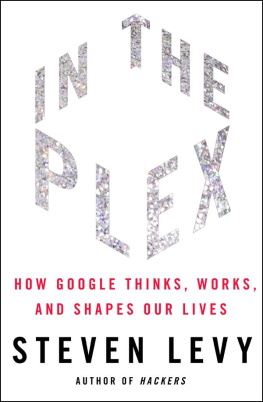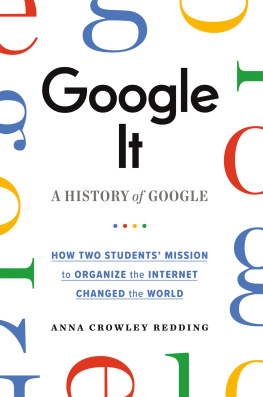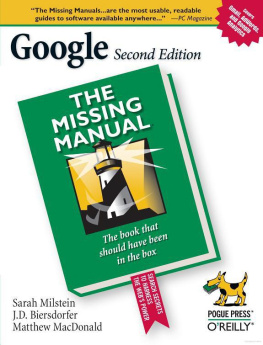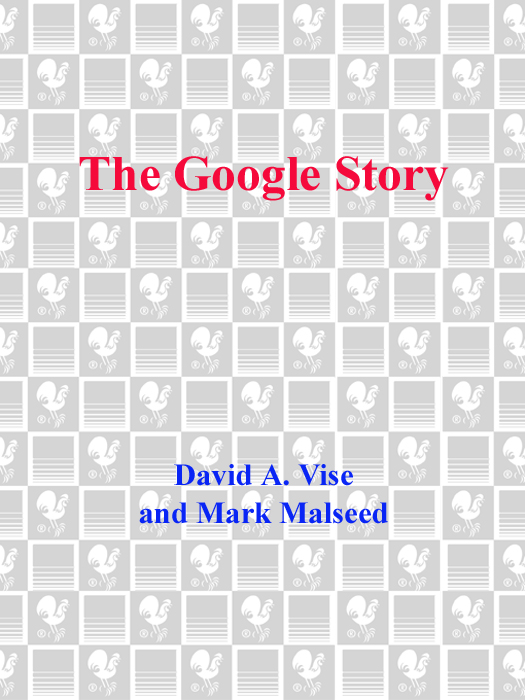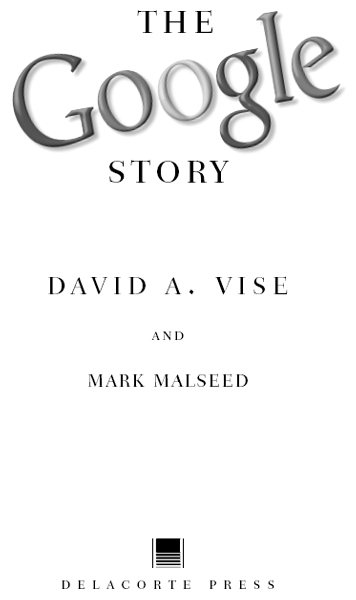Also by David A. Vise
Eagle on the Street
(with Steve Coll)
The Bureau and the Mole
Sweet Redemption
THE GOOGLE STORY
A Delacorte Book / November 2005
Published by
Bantam Dell
A Division of Random House, Inc.
New York, New York
All rights reserved
Copyright 2005 by David A. Vise
Poem on used courtesy of Google.
Delacorte Press is a registered trademark of Random House, Inc., and the colophon is a trademark of Random House, Inc.
Library of Congress Cataloging in Publication Data is on file with the publisher
eISBN: 978-0-440-33570-2
www.bantamdell.com
v3.1
To Lori
My search was over the day I met you
To my parents, Roger and Zoriana
Contents
Introduction
Not since Gutenberg invented the modern printing press more than 500 years ago, making books and scientific tomes affordable and widely available to the masses, has any new invention empowered individuals, and transformed access to information, as profoundly as Google. With its colorful, childlike logo set against a background of pure white, Googles magical ability to produce speedy, relevant responses to queries hundreds of millions of times daily has changed the way people find information and stay abreast of the news. Woven into the fabric of daily life, Google has seemingly overnight become indispensable. Millions of people use it daily in more than 100 languages and have come to regard Google and the Internet as one. The quest for immediate information on anything and everything is satisfied by googling it on a computer or cell phone. Men, women, and children have come to rely so heavily on Google that they cannot imagine how they ever lived without it.
Googles transcendent and seemingly human qualities give it special appeal to an amazingly wide range of computer users, from experts to novices, who trust the brand that has become an extension of their brains. That appeal is universal, enabling it to overcome differences in culture, language, and geography en route to becoming a global favorite. For a young firm that has not spent money to advertise or promote its brand name, these are unparalleled achievements. Googles growth has occurred entirely by word of mouth, as satisfied users recommend it to their friends, and others learn about it through the media and online. No Madison Avenue marketers have pushed it. Instead, people have come to feel emotionally attached to the search engine, calling on it whenever they wish to satisfy their interest or curiosity. In an uncertain world, Google reliably provides free information for everyone who seeks it. It is a seductive form of instant gratification for their minds.
Most Google users have no idea how the search engine was created, what makes it so profitable and valuable, why it has triumphed over deeper-pocketed competitors, and where it is heading in the future. In the pages of this book, we will answer all these questions for the first time. Until now, most of the answers have remained secret, hidden deep inside the Googleplex, the companys space-age Silicon Valley campus.
John Hennessy, a top computer scientist who is president of Stanford University and a Google board member, says the firm is unique in todays bifurcated world of sophisticated software and hardware companies because it is a leader in both areas. To power its search and search-related services, Google runs patented, custom-designed programs on hundreds of thousands of machines that it also custom builds. The optimal blending of technologies by the worlds most innovative company produces superior search results instantaneously. No word in the English language exists to describe this seamless melding of hardware and software at such a massive scale, so we have named it Googleware.
Hennessy says that the most important technological advantage distinguishing Google from would-be competitors is that its employees assemble and customize all of the personal computers the company uses to carry out searches. This is perhaps Googles best-kept secret. Experts generally regard personal computers as commodity products, akin to toasters, but Google assembles, deploys, and is constantly improving the performance capabilities of more than 100,000 inexpensive PCs. It builds and stacks them atop one another in refrigerator-size racks, stringing them together with patented software and wiring. No enterprise has more computing power than Google with its network of garden-variety PCs on steroids.
They run the largest computer system in the world, Hennessy said. I dont think there is even anything close.
In an age of specialization of labor, Google secretly assembles each and every PC in its massive network inside secure facilities that are strictly off-limits to outsiders, including visitors to the Googleplex who think they have seen it all. Google is able to do this affordably because the massive scale of its operation makes it cost-effective and of higher quality than buying custom PCs from someone else. Working together, these customized computers rapidly carry out searches by breaking the queries down into tiny parts. These parts are processed simultaneously by comparing them to copies of the Internet that have been indexed and organized in advance.
With plenty of redundancy built into its network, Google is able to reliably fire up more and more computers daily, rapidly returning search results without a glitchand without human interventioneven as some PCs burn out and are not replaced. Instead, other PCs take over. Remarkably, as Hennessy noted, there is no comparable computer network or database in the public or private sector anywhere in the world.
They realized early on that if they did a good job with the hardware, that it could be a competitive strength for the company, he said. The hardware would be the key factor in being able to do search efficiently. And they are replicating computers at such a large volume that it makes sense to do it themselves. It is why launching a search engine that is competitive with Google would require a much larger capital investment than people realize.
Thanks to the inclusion of small, highly targeted text advertisements that searchers click on for information, Google the search engine became Google the money machine a few years ago. This was while Google was still private, and thus inscrutable to all but the innermost circle of early investors and employees. But once its stunningly rapid growth and billions of dollars in ad-generated profits became public knowledge, a growing legion of investors recognized that something unique was going on and sought to own a part of it. On August 19, 2004, Google went public in an unconventional initial public offering at $85 per share, raising nearly $2 billion in the largest technology IPO ever. In less than a year, the stock soared to more than $300 per share, making it a financial and technology powerhouse without peer. In the seven years after Googles founding in 1998, Microsoft stock did not increase in value at all. During that same period, Google shares came to be worth more than $80 billion.
If by chance you missed out on this bonanza, remember that the experts did too. Blue-chip venture capital firms, Yahoo!, AltaVista, and many other major search engine and technology companies approached by Stanford University turned down the chance to buy Googles search system for $1 million. Their refusals forced Stanford Ph.D. students Sergey Brin and Larry Page to reluctantly drop out of school and start the firm. By the summer of 2005, each of the founders had a net worth of more than $10 billion.




